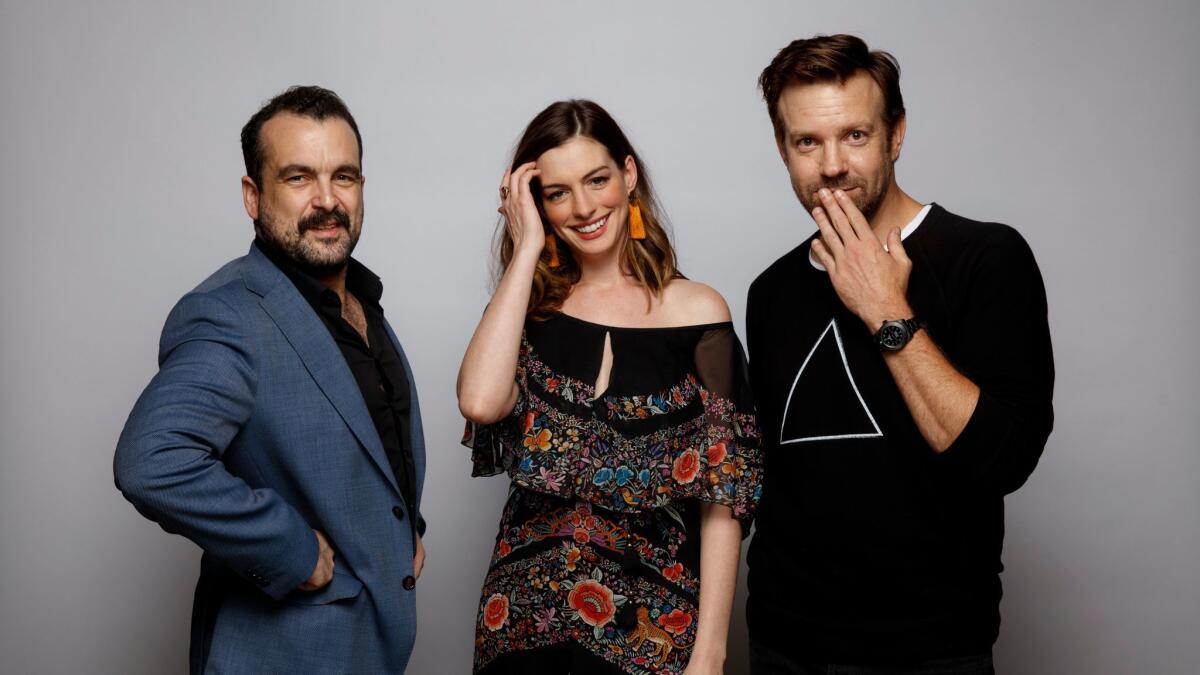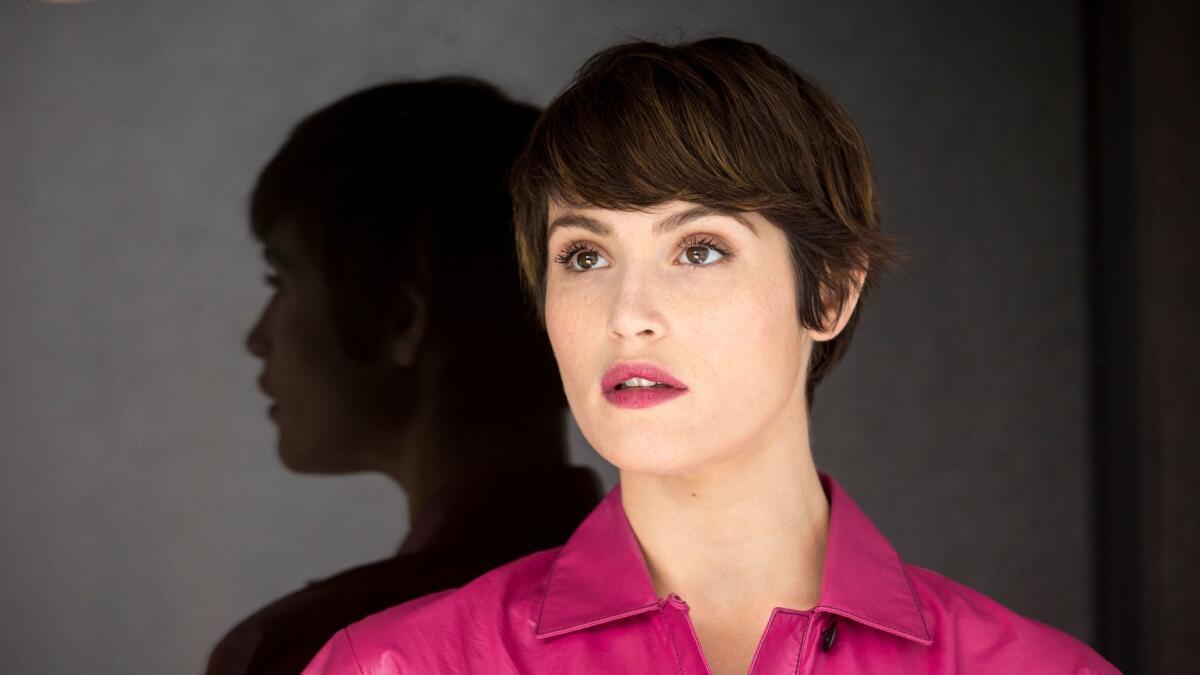Newsletter: Indie Focus: Struggles between women and men in ‘Colossal,’ ‘Their Finest’ and ‘Your Name’
- Share via
Hello! I’m Mark Olsen, and welcome to another edition of your regular field guide to a world of Only Good Movies.
Last week I mentioned how the conversation that had popped up around the new “Ghost in the Shell” and that exchange of ideas definitely seems more important, creative and productive than the movie itself.
This week The Times’ own Justin Chang and Jen Yamato published an incisive conversation about the ongoing issue of “whitewashing,” whereby Asian actors and stories (or those of any culture that doesn’t easily default to white casting) are simply recast and reframed via any number of common excuses.
As Yamato put it, “The filmmakers behind these properties, nearly all white men, are forcing white preference and white privilege into the spotlight and blaming it on a system that necessitates bankable white stars. The more these movies bomb while others like ‘Get Out’ flourish, the more these excuses get exponentially more tedious.”
Our recent screenings of “Gifted” and “The Lost City of Z” were real successes. In particular, the Q&A with “Lost City” director James Gray was something of an epic treaty on the importance of cinema’s past, present and future. (Really!) Keep on the lookout for future events at events.latimes.com.
‘Colossal’
Filmmaker Nacho Vigalondo has been a favorite among those on the film festival circuit for a few years. His latest, “Colossal” looks to break him out to a bigger audience. The film stars Anne Hathaway as a young woman struggling to move her life forward as she returns to her hometown and revives a relationship with a man who never left, played by Jason Sudeikis. And when two monsters mysteriously appear in South Korea, there is an unexpected connection.
For The Times, Justin Chang wrote that Vigalondo “has fashioned a sly, winking homage to Godzilla and other kaiju in the Asian monster-movie canon, and hitched it, in ways both ridiculous and intuitive, to a story about a major American screw-up trying to get her life back on track.”

For the New York Times, A.O. Scott wrote, “Mr. Vigalondo’s film is nowhere near as ambitious or as rigorous as Jordan Peele’s ‘Get Out,’ but it shares that movie’s interest in using horror movie tropes to unlock heavily defended areas of social unease. Starting out as the portrait of an irresponsible woman, ‘Colossal’ turns into a critique of male self-pity, as Gloria’s problems collide with, and are overwhelmed by, Oscar’s sense of aggrieved entitlement.”
Most reviews seemed to focus more on Hathaway, even positioning the film as some kind of comeback. At MTV, Amy Nicholson wrote, “Hathaway must be thrilled to have her best showcase in years. She commits to roles like a boozehound ordering a row of shots, even when the parts don’t deserve her. They often don’t.… Her zeal is intimidating, and her earnestness can seem embarrassing when we prefer our stars to act like they tumbled out of bed and into the spotlight.”
At Vulture, Kyle Buchanan wrote about why “it’s not cool to hate Anne Hathaway Anymore,” sentiments that were echoed in an unexpectedly personal interview with the actress by Rich Juzwiak at Jezebel. As Hunter Harris put it in her own piece for Vulture, saying of Hathway’s character “that ‘Colossal’ never begs us to like Gloria is the key to understanding its point: This woman doesn’t have to be quirky or funny to deserve our empathy or the men’s respect.”
‘Their Finest’
Women’s roles in cinema and society also becomes the centerpiece of “Their Finest,” the new film from Danish director Lone Scherfig. Among the producers on the film is Amanda Posey, who worked with Scherfig on “An Education” as well as John Crowley’s “Brooklyn,” and anyone who liked those two films would do well to see “Their Finest” as well. The new film tells the story of an English film production during World War II and the struggle of a female scriptwriter (Gemma Arterton) to be taken seriously.
In his review for The Times, Kenneth Turan called the film “a treat that has something on its mind, a charming concoction that adds a bit of texture and bite to the mix. Genial and engaging with a fine sense of humor, it makes blending the comic with the serious look simpler than it actually is.”

For the AP, Lindsey Bahr says it “is a movie about making a movie, specifically a glossy propaganda film meant to bolster morale in Britain in the darkest days of the Second World War. It is also very much a movie-movie. Good-looking, finely acted, and well-told, director Lone Scherfig (‘An Education’) has made a charming, witty and romantic gem. It is ‘Shakespeare in Love’ in World War II.”
The Times’ Jen Yamato spoke to Arterton, Scherfig and Posey about the movie and how its female-driven story on-screen was reflected in its production as well.
“From a creative instinct, you find the interesting stories in the untold stories — and the untold stories are often women’s stories,” Posey said. “Just as Gemma’s character fights to tell the ordinary women’s story, that’s what, behind the camera, we were trying to tell as well.”
‘Gifted’
Something of an upbeat tear-jerker, “Gifted,” directed by Marc Webb, is about a little girl (Mckenna Grace) being raised by her uncle (Chris Evans) who becomes the center of a custody battle after she turns out to be a math prodigy. The cast is rounded out by Jenny Slate, Octavia Spencer and Lindsay Duncan.
In his review for The Times, Justin Chang called the film “crisply directed by Marc Webb from an agile, acerbic script by Tom Flynn, ‘Gifted’ initially displays the kind of disarming precocity that feels well suited to its subject.... And for a while they attempt to avoid the pitfalls of excessive earnestness and melodramatic hand-wringing that can attend this particular sub-genre.”
At the Chicago Tribune, Michael Phillips likewise gave the film a mixed review, calling it a mashup of “Proof,” “Kramer vs. Kramer” and “Little Man Tate” while saying “everyone involved with ‘Gifted’ no doubt intended a sweet, affecting, sincere and, as manipulative heartwarmers go, relatively low-key affair.… But virtually no one involved appears to have remembered what human or human-adjacent behavior should feel like, scene to scene. Easier said than done.”
What the film may ultimately be remembered for is that Slate and Evans had a very public personal relationship in the time since the film’s prodcution, but that had cooled by the time of its release. Slate gave an extremely honest interview to Jada Yuan at Vulture about it.
“I don’t mind talking about him at all. He’s a lovely person,” she says. “I don’t know. It feels like such a huge thing. Last year was a giant, big year for my heart. I’ve never, ever thought to keep anything private because that’s not really what I’m like, and now I’m learning those things, and they’re weird, kind of demented lessons to learn.”
‘Your Name’
A huge hit in its native Japan, the animated film “Your Name.,” directed by Makoto Shinkai, is something of a body-swap young-adult coming-of-age romance. The film had a brief qualifying run last year and picked up the Los Angeles Film Critics Assn.’s prize for best animated film.
Reviewing the film for The Times, Justin Chang called the film “an animated epic of love, death, time and destiny” while going on to note “the sweetness of ‘Your Name.’ never descends into the saccharine, just as the story’s topsy-turvy silliness never undercuts its fundamental seriousness.”
For the New York Times, Manohla Dargis added how the film shifts “from a comedy of confusion into a deeply moving meditation on nation, history, catastrophe and memory. It’s a touching, soaring switcheroo.”
At Vulture, Emily Yoshida wrote “Shinkai’s latest, which broke box-office records in Japan last year, brims over with ideas, its synapses firing faster and faster as its initial body-swapping scenario is bound up with notions of time, memory, and loss. It’s a film not just about the connection between a boy and a girl, but the way each of them connect to and relate to their world through their own eyes and each others. It’s only barely a romance, bypassing much of that familiar territory to explore something much more intimate and strange.”
In the New York Times last year, Motoko Rich interviewed Shinkai and asked him about his attention to ornate, minute details, to which he responded, “I pay attention to the things that nobody else is looking at. In daily or everyday life, I am so impressed with tiny details, like when I look up at a street lamp falling on the street, it seems to have meaning or so much information in it.... The world has created everything perfectly.”
Email me if you have questions, comments or suggestions, and follow me on Twitter: @IndieFocus.
More to Read
Only good movies
Get the Indie Focus newsletter, Mark Olsen's weekly guide to the world of cinema.
You may occasionally receive promotional content from the Los Angeles Times.











